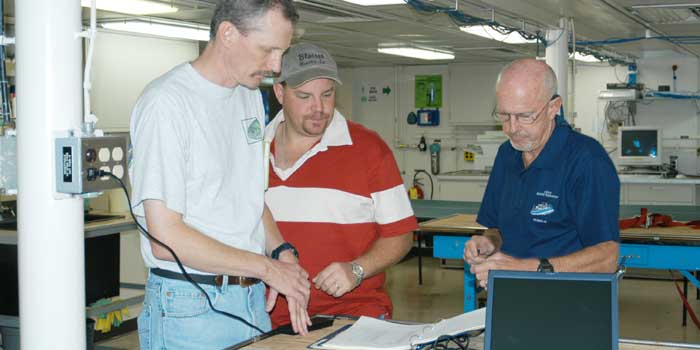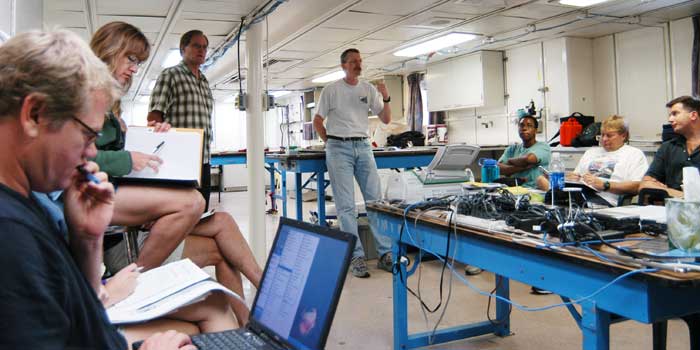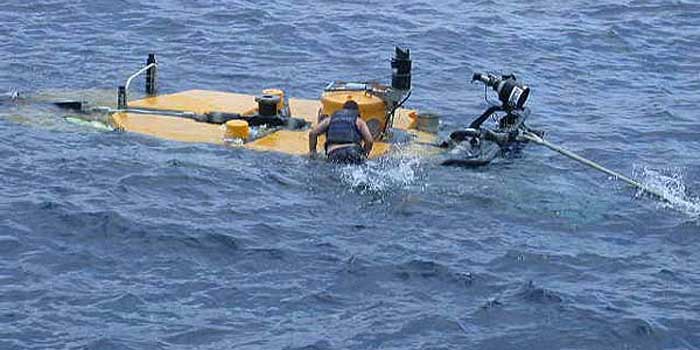John McDonough: Video Transcript
Hear John talk about his job and what it's like to conduct science while at sea. Download (mp4, 133 MB).
What is your job in the Office of Ocean Exploration?
I actually came to the Office of Ocean Exploration initially to organize and coordinate operations. I did that for a couple of years, and now I work directly with the Ocean Exploration Director and essentially manage the office and work with the leads for each of our functional areas: people who focus on education, outreach, operations, data management, things like that. I consider myself kind of the person who helps keep these things together.
The Ocean Exploration program is very creative. There is a lot that we can do to further develop certain aspects of the program, such as allowing people to be creative within their positions. I feel that’s probably the most important aspect of my job—allowing that creativity to happen—and ensuring that the work gets done.
What is your background?
My background- my school background - is in physical geography. I received a degree from the University of Maryland in physical geography, primarily focusing on coastal geomorphology. It seems like a long stretch from people management skills, but it did give me the foundation in terms of the information and science that you need for a job like this, even though that was focusing on coastal processes and issues as opposed to much of the deep water work that we do. Still, once you pick up the language and understand some of the physics behind these different things, it’s easy to apply across the board. An important thing I learned in school as well is time management. That’s critical in the types of jobs we’re doing right now- being able to juggle several different tasks at once.

Dr. McDonough served as the project manager for large-scale undersea research expeditions.
Is this an area you’ve always been interested in, or did you take a round-about route to get here?
It was a round-about route, but when I think back on it, I’ve always been very interested in and engaged in outdoor activities—everything from fishing, to hiking, to rock climbing, and things like that. And I think having kind of that core-foundation of interests gave me something to build on when I started thinking about what I was going to do in school. I’d say the most interesting thing about school, and one of the reasons I mentioned time management, is that although you do pick up the language and you do pick up the information base and skills from school, if you can’t manage time appropriately then it’s harder to apply the information that you have derived.
What would you consider your most important real-world experience?
I would say that one of the most important real-world experiences that I had was what actually got me to consider going to college to begin with. I had dropped out of school. I had gotten my GED, so I had the diploma. I did that at a very young age. I moved out of my house when I was 17 years old and just went to work in the real world. And I had been engaged with some friends in falconry, and had been flying falcons and things like that, and we had come up with an idea to go to Hawaii and spend several months doing research on the Hawaiian hawk, which is a species that’s indigenous to the Hawaiian Islands. It is found nowhere else in the world and it’s very unusual for that type of bird to have evolved in that area. We spent several months there, we filmed the birds, we did some of the research that we could at the University in Hawaii, meeting with some of the professors and folks like that. And that enabled me to look back at myself and understand that I didn’t have all of the strengths that I needed to actually put all of this information into a package and really organize it quite well. So I would say that was kind of a watershed moment which caused me to seriously consider going back to school based on that experience.

Dr. McDonough leads science discussions on board the NOAA Ship Ronald H. Brown.
You mentioned that you dropped out of school. Why did you drop out, and at what age?
I dropped out of school when I was 16. This was high school, but I really had not been doing much in relation to high school after the 9th grade. When I was there I had been skipping school and doing things with friends, and spending a lot of time with friends off campus essentially. And I think the primary reason I had dropped out is because I had made a transition from parochial school to public school. I went to parochial school from Kindergarten through sixth grade before making the transition to public school, and when I did I found out that much of what they were teaching me there I had been learning in earlier grades—in second grade even—in parochial school. So I think a lot of it for myself personally was sheer boredom, and looking for other things to do. So in looking for other things to do, I was always fascinated with the outdoors, so I was spending as much time as I could outdoors. I used to go out with friends and do some pretty wild things, like hopping freight trains and doing things like that. Spending a lot of time on the Potomac River, that attracted me a lot more than anything I was getting out of school at the time.
You mentioned that while you were in Hawaii, you really go into falconry and then you decided to go back and get your GED. Was that purely because you felt you wanted to go back and enhance some of your skills, or was it also because you had the idea of going to college in mind?
I got my GED when I was 17. I recognized even after I dropped out of school that there were limits on what I could do without having at least my high school diploma. So I studied a couple of weeks and took the GED, so at least I had that in hand, but had no intention of going to college. It was after I had been Hawaii and doing work on the Hawaiian Hawk, and I had been involved in falconry, that I made the decision to go back to college. I had a plan in mind when I went back to college, but of course between the time I dropped out and the time I went into college, there was probably about a 7 or an 8 year gap. So I had been learning a lot by working different jobs, and doing things like that definitely helped influence my decision and provide a focus for school. The other thing that definitely made me pay more attention in college was the fact that I was paying for it myself. So it was my own investment and I was looking out to protect my investment.

Overseeing dive operations including launch and recovery of the Clelia are just a few of the functions Dr. McDonough provided as Coordinator at sea.
What other types of things do you think that someone with your background could do?
I would say there are probably a wide variety of things that someone with this type of background can do. I think one of the advantages of going down the path of geography is that it is always looking at different aspects of the environment as opposed to focusing on any one thing. So having somewhat of a diverse background in terms of understanding a little bit about biology, ecology, geology and other things like that allows you to communicate better with people who are in the field focusing on the individual aspects of things.
What can the students or young people of today look forward to doing in the realm of ocean exploration in the near future?
It’s hard to gauge, we’ve seen so many changes just in this small period of time- 7 years or so that I have been involved in doing this type of work. And I continue to see the pace of that accelerate. Technologies are changing in terms of our ability to actually get to the bottom of the ocean and observe things remotely. Our ability to transfer data real-time certainly continues to expand and grow, so I just see the opportunities continue to accelerate.
With those evolving technologies, and evolving capabilities, do you see different types of jobs being pulled into what people can do?
Oh yeah, definitely, because when you go out to sea and get on a ship, at least for me, I was struck by the fact that this is really a community out at sea. Everything that you rely on ashore has to be replicated at sea. A lot of things that you don’t even think about, such as electricity, water and sewage, food and things like that. It really is a microcosm of a community at sea, so when you talk in terms of opportunity, I mean people that work onboard the ship include chefs, janitors… every job that you would see in a community is replicated on board the ship, up to the higher level positions - running the ship itself, being the ship’s captain, being the chief engineer, being a deck hand who understands the equipment on the deck and how that actually operates to deploy the instruments that you need to do. So there are technical positions, engineering positions, regular what you would call “blue-collar” positions, and then there are the science positions as well. So I see people from many different backgrounds working on the ships out there as well. It’s incredible.
Return to profile